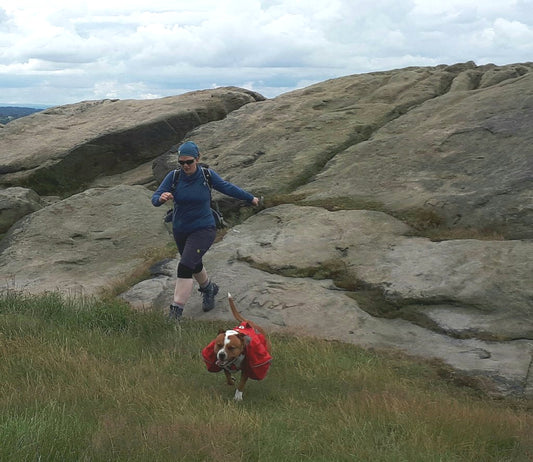
Megan Hine’s 5 Survival Tips for life – Learnt from the Wilderness
Megan Hine is a survival expert, adventurer and generally an awesome human. Once in a lifetime adventures happen to her all the time, she rolls from one exploit to another, gaining anecdotes and life experience as she goes.
From our view from the sofa it seems like a charmed life but most of us would struggle with the hardships, the fear of gun-toting drug lords, lions and bears and the constant travel away from loved ones. Megan has learnt some resounding life lessons from her work that we can apply to ours, all documented in her book, Mind of Survivor. I’ve already started following a few of them and I’ve not been fired yet.
1/, Use your Intuition – you’re feeling it for a reason
“Intuition is often described as a ‘gut feeling’ or a ‘sixth sense’. But it has a scientific root: it’s your subconscious protecting you by using information you’ve stored from previous experiences, then sending a flare to your conscious brain.” “In the wild, it might be something tiny that saves your life, perhaps the way leaves rustle in a wind that can tell you a storm is coming or animal behaviour that shows a predator is near, but you don’t have to be in a jungle to practise this: in your back garden there will be indications that something is about to change. Blackbirds, for instance, are very vocal and use a range of alarm calls depending on the threat, such as whether a predator is on the ground or in the sky.” “We’ve all met people we just get a bad feeling about when we’re introduced to them for the first time. Often we don’t know why we take against them, but we’ll subsequently find something about them that explains our initial reticence.” ‘Hunches’ and ‘feelings’ can be based on real experiences which, in the workplace, we can be hesitant to express, we don’t want to make a fuss, but maybe, sometimes, it’s worth sticking your head up.
2/. Control your emotions
“The ability to control your emotions under pressure isn’t just vital in survival situations, it’s extremely helpful in everyday life too”. “Getting angry with a driver who cuts you up on the road doesn’t do any good, especially as – just like in the wilderness – they don’t know or care if you’re angry and upset. In the wild, it’s potentially catastrophic: the last thing you want to be doing is fuming about something trivial when you need every brain cell working hard to keep you alive”. Everyone deals with their emotions differently but sometimes they just aren’t useful and it might be more useful to put them aside for a later date when you can process better.
3/. Make that decision,
In survival situations, you need to make decisions. Should I leave camp to find help? Should I make a fire or go and find water first? Regular life throws decisions your way too, shall I apply for that promotion? Should I have run across the busy road to get the last doughnut from Greggs? They are decision which will affect your life and perhaps death but how do you know what is a right decision and what is a wrong decision? There is no way to tell but you can slow down the thought process and think as clearly as possible to give yourself the best chances. “The acronym STOP may help: it stands for Sit down; Think; Observe; Plan” “You can apply that strategy to any aspect of life when panic gets in the way. If you find yourself running around like a headless chicken – STOP. Slowing the decision-making process can remove the panic”.
But what if it’s the wrong decision? After a hairy encounter with a bear in Romania, Meg was forced to think back over the decisions made “once we’d realised we were in trouble, though, we backed ourselves and followed through: if there’s one thing more dangerous than a wrong decision in a survival scenario, it’s indecision”.
4/. Learn to accept when things go wrong.
“In a real survival situation, panic can be your worst enemy. It is a normal response to finding yourself lost, or stranded, or injured, but if there’s no one to help, you need to find a way to suppress it. If you can’t control your emotions you won’t be able to use your greatest asset – your mind – to its fullest capabilities.”
In the wild this can be accepting that you forgot to pack water, that your plane has crashed in the jungle or that you’ve been bitten by a snake which may or may not be one of the world’s most deadly. Keeping a cool head and thinking it through will contribute to keeping you alive.
“You see it in everyday life too, whether it’s the guy on the train fuming into his phone because there’s a delay, or someone complaining in a restaurant because the kitchen got their order wrong. If they could keep a clear head, they’d be much more likely to resolve their problems quickly.”
5/. Learn to control your fear
“There’s nothing macho or impressive about not being scared. In fact, if you never feel fear it almost certainly means you’re not recognising when you’re in trouble: it’s an evolutionary response to danger. Fear is an indication that something is wrong and your body is telling you to be aware of it.” There are times when the fear can get the better of you and crippling fear takes over forcing bad decisions and blind panic.
“Fear is something we also experience in our everyday lives but, unlike when you’re hanging on a rope over a cliff edge, it can be hard to pinpoint the exact cause. These less obvious metaphorical cliffs aren’t so easily conquered with rational thought and often lead to chronic anxiety”. “I’ve found being able to control fear at the cliff edge gives my brain the ability to overcome anxieties on other fronts too: what I learn in the wild often helps me at home”.
For more insights on the Mind of a Survivor and more of the exploits and adventures that have helped form Megan’s wisdom, check out her book – available from Amazon
If you want to hear more from Megan you can check out her Tough is Beautiful and Talking Merino blogs for FINDRA
From our view from the sofa it seems like a charmed life but most of us would struggle with the hardships, the fear of gun-toting drug lords, lions and bears and the constant travel away from loved ones. Megan has learnt some resounding life lessons from her work that we can apply to ours, all documented in her book, Mind of Survivor. I’ve already started following a few of them and I’ve not been fired yet.
1/, Use your Intuition – you’re feeling it for a reason
“Intuition is often described as a ‘gut feeling’ or a ‘sixth sense’. But it has a scientific root: it’s your subconscious protecting you by using information you’ve stored from previous experiences, then sending a flare to your conscious brain.” “In the wild, it might be something tiny that saves your life, perhaps the way leaves rustle in a wind that can tell you a storm is coming or animal behaviour that shows a predator is near, but you don’t have to be in a jungle to practise this: in your back garden there will be indications that something is about to change. Blackbirds, for instance, are very vocal and use a range of alarm calls depending on the threat, such as whether a predator is on the ground or in the sky.” “We’ve all met people we just get a bad feeling about when we’re introduced to them for the first time. Often we don’t know why we take against them, but we’ll subsequently find something about them that explains our initial reticence.” ‘Hunches’ and ‘feelings’ can be based on real experiences which, in the workplace, we can be hesitant to express, we don’t want to make a fuss, but maybe, sometimes, it’s worth sticking your head up.
2/. Control your emotions
“The ability to control your emotions under pressure isn’t just vital in survival situations, it’s extremely helpful in everyday life too”. “Getting angry with a driver who cuts you up on the road doesn’t do any good, especially as – just like in the wilderness – they don’t know or care if you’re angry and upset. In the wild, it’s potentially catastrophic: the last thing you want to be doing is fuming about something trivial when you need every brain cell working hard to keep you alive”. Everyone deals with their emotions differently but sometimes they just aren’t useful and it might be more useful to put them aside for a later date when you can process better.
3/. Make that decision,
In survival situations, you need to make decisions. Should I leave camp to find help? Should I make a fire or go and find water first? Regular life throws decisions your way too, shall I apply for that promotion? Should I have run across the busy road to get the last doughnut from Greggs? They are decision which will affect your life and perhaps death but how do you know what is a right decision and what is a wrong decision? There is no way to tell but you can slow down the thought process and think as clearly as possible to give yourself the best chances. “The acronym STOP may help: it stands for Sit down; Think; Observe; Plan” “You can apply that strategy to any aspect of life when panic gets in the way. If you find yourself running around like a headless chicken – STOP. Slowing the decision-making process can remove the panic”.
But what if it’s the wrong decision? After a hairy encounter with a bear in Romania, Meg was forced to think back over the decisions made “once we’d realised we were in trouble, though, we backed ourselves and followed through: if there’s one thing more dangerous than a wrong decision in a survival scenario, it’s indecision”.
4/. Learn to accept when things go wrong.
“In a real survival situation, panic can be your worst enemy. It is a normal response to finding yourself lost, or stranded, or injured, but if there’s no one to help, you need to find a way to suppress it. If you can’t control your emotions you won’t be able to use your greatest asset – your mind – to its fullest capabilities.”
In the wild this can be accepting that you forgot to pack water, that your plane has crashed in the jungle or that you’ve been bitten by a snake which may or may not be one of the world’s most deadly. Keeping a cool head and thinking it through will contribute to keeping you alive.
“You see it in everyday life too, whether it’s the guy on the train fuming into his phone because there’s a delay, or someone complaining in a restaurant because the kitchen got their order wrong. If they could keep a clear head, they’d be much more likely to resolve their problems quickly.”
5/. Learn to control your fear
“There’s nothing macho or impressive about not being scared. In fact, if you never feel fear it almost certainly means you’re not recognising when you’re in trouble: it’s an evolutionary response to danger. Fear is an indication that something is wrong and your body is telling you to be aware of it.” There are times when the fear can get the better of you and crippling fear takes over forcing bad decisions and blind panic.
“Fear is something we also experience in our everyday lives but, unlike when you’re hanging on a rope over a cliff edge, it can be hard to pinpoint the exact cause. These less obvious metaphorical cliffs aren’t so easily conquered with rational thought and often lead to chronic anxiety”. “I’ve found being able to control fear at the cliff edge gives my brain the ability to overcome anxieties on other fronts too: what I learn in the wild often helps me at home”.
For more insights on the Mind of a Survivor and more of the exploits and adventures that have helped form Megan’s wisdom, check out her book – available from Amazon
If you want to hear more from Megan you can check out her Tough is Beautiful and Talking Merino blogs for FINDRA
Share
You might also be interested in

Customer of the Month: Phoebe Montgomery
Hi, my name is Phoebe and I am 29 years old, I live with my rescue Staffie, Olly. I found Olly, along with 14 other puppies in a bin where...
Customer of the Month: Phoebe Montgomery
Hi, my name is Phoebe and I am 29 years old, I live with my rescue Staffie, Olly. I found Olly, along with 14 other puppies in a bin where...

In the Spirit of Enjoyro: Dee Hollingsbee
I’m not good at Cycling events. I’m better on the ‘wrong’ side of registration, usually in a Tweedlove volunteers shirt and playing to my strength. Talking. I did the Glentress...
In the Spirit of Enjoyro: Dee Hollingsbee
I’m not good at Cycling events. I’m better on the ‘wrong’ side of registration, usually in a Tweedlove volunteers shirt and playing to my strength. Talking. I did the Glentress...

